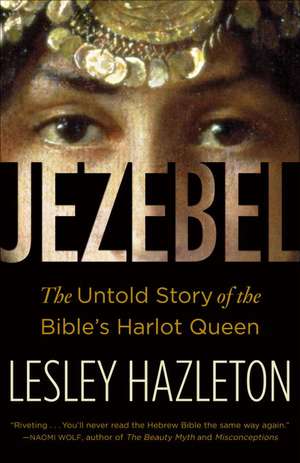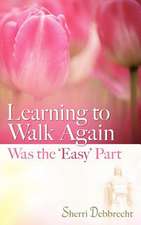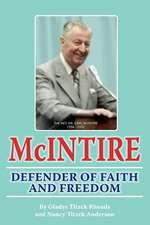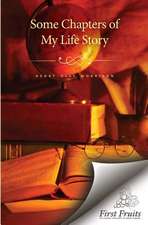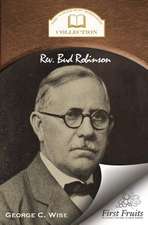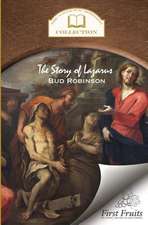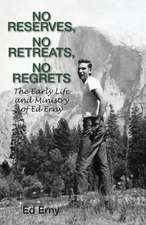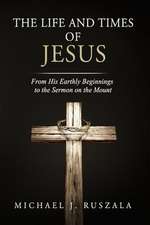Jezebel: The Untold Story of the Bible's Harlot Queen
Autor Lesley Hazletonen Limba Engleză Paperback – 28 feb 2009
In this remarkable new biography, Lesley Hazleton shows exactly how the proud and courageous queen of Israel was vilified and made into the very embodiment of wanton wickedness by her political and religious enemies. Jezebel brings readers back to the source of the biblical story, a rich and dramatic saga featuring evil schemes and underhanded plots, war and treason, false gods and falser humans, and all with the fate of entire nations at stake. At its center are just one woman and one man—the sophisticated Queen Jezebel and the stark prophet Elijah. Their epic and ultimately tragic confrontation pits tolerance against righteousness, pragmatism against divine dictates, and liberalism against conservatism. It is, in other words, the original story of the unholy marriage of sex, politics, and religion, and it ends in one of the most chillingly brutal scenes in the entire Bible.
Here at last is the real story of the rise and fall of this legendary woman—a radically different portrait with startling contemporary resonance in a world mired once again in religious wars.
Preț: 101.17 lei
Nou
Puncte Express: 152
Preț estimativ în valută:
19.36€ • 21.04$ • 16.28£
19.36€ • 21.04$ • 16.28£
Carte disponibilă
Livrare economică 31 martie-14 aprilie
Preluare comenzi: 021 569.72.76
Specificații
ISBN-13: 9780385516150
ISBN-10: 0385516150
Pagini: 258
Dimensiuni: 136 x 204 x 19 mm
Greutate: 0.22 kg
Editura: Doubleday Books
ISBN-10: 0385516150
Pagini: 258
Dimensiuni: 136 x 204 x 19 mm
Greutate: 0.22 kg
Editura: Doubleday Books
Notă biografică
LESLEY HAZLETON is the author of three acclaimed books about the Middle East—Israeli Women, Where Mountains Roar, and Jerusalem, Jerusalem. Her most recent book is Mary: A Flesh-and-Blood Biography of the Virgin Mother. A former psychologist, she reported from Israel for Time magazine, and has written on Middle Eastern politics for The New York Times, Esquire, Vanity Fair, The Nation, The New Republic, The New York Review of Books, and other publications. She lives in Seattle, Washington.
Extras
1.
Tyre
in which Jezebel is homesick
She is not conventionally beautiful. She is, rather, utterly striking. The long aquiline nose, the heavy shaped eyebrows, the proud, almost disdainful set to her mouth, all speak of a young woman born to wield authority, used to being obeyed. Except by sleep.
She wakes in the night with her throat parched and dust in her nostrils. It’s been just a few hours since her attendants sprinkled the floor with citron–scented water to freshen the air, but the relief hasn't lasted. The heavy tapestries on the walls hold the heat, and now it seems to close in on her. She needs to get out into the open air. Perhaps there she can breathe free.
The truth is she has not slept through the night since she arrived in this landlocked kingdom, though it would be beneath her to complain of it. She was born a princess royal, after all, the leading daughter of the first great maritime empire in the world, and everything about her declares her status. The regal carriage of long neck and straight spine, the head held high so that she seems tall even by modern standards, the fluid motion as she rises and drapes a deep purple robe over her shoulders—she is every inch the aristocrat.
This is Jezebel at age fifteen, newly arrived in Samaria for her wedding to Ahab, the king of Israel. The week–long celebration of her marriage is nearing its end. In the morning she will be crowned queen, and she and Ahab will become husband and wife. She is not sure if this is something she wants or dreads.
A peacock’s cry, that’s what woke her. She hears it again, the long mournful high–pitched sound echoing through the stone courtyards, as though the creature had to pay for being so beautiful to look at by being so discomforting to listen to.
She steps carefully, barefoot. If she is quiet, she can have this time to herself and be alone for the first time since she left Tyre. The maidservants lying on the floor at the foot of her bed stir but don't wake. The sleeping eunuchs outside the doors guard a chamber empty of royalty as she heads for the stairs to the tower of the western gate. In the light of the full moon, perhaps she can catch a glimpse of the sea.
She can never let anyone know how much she misses that great expanse of water. Her lungs long for the rhythmic breath of it, her ears for the sounds of seabirds wheeling above it. Tyre was an island city, surrounded by water, and only now, in its absence, does she realize how the sea has cradled her life. There are sea people and there are hill people, she thinks, and she is a sea person marooned in a country of hill people. Even the way they speak reflects the harshness of the hills-the Phoenician and the Israelite languages so close, essentially different dialects of the same tongue, yet so different to the ear. Where the Phoenician is soft and sibilant, like lapping water, the Israelite Hebrew carries the harshness of stone and dust. It is the dialect of a warrior people.
She took water for granted in Tyre. It splashed in fountains in the palace courtyards and the temple forecourts; idled mirrorlike in ornamental pools planted with lotus, the flower of the great goddess Astarte; was poured gracefully from silver jugs into glass goblets filled with fresh mint. The sweetest water to drink, soft and refreshing. Yes, she thinks, even the water was gentle.
Here in Samaria it tastes hard, like the stone it comes out of. Here, nobody can take water for granted. They live in constant fear of its absence, in terror of drought and the starvation that accompanies it. How not, when their god Yahweh seems to use it as a weapon, threatening to withhold it? He is so like and yet so unlike Phoenicia’s Baal Shamem, the Lord of the Skies, who rises anew each year with the first rains, willingly giving the gift of water when he is rescued by his sister Anat from the jaws of the death god Mot. Both Yahweh and Baal Shamem ride the storm clouds. Both carry lightning bolts in their chariots. Both speak in thunder. They could be brothers, even twins. But no, this Yahweh of Israel turns his back on all the other gods and rules alone in this land—the one and only Israelite god, at least according to his prophet Elijah, who claims to hear his voice and to speak for him. Jezebel thinks it all very strange. Surely the more gods you acknowledge, the safer you are in the world they rule. How could there ever be too many gods? But she is willing to respect the Israelites’ choice. When you believe in many gods, you respect those of other people, even if they only have one. It has never occurred to her before that the tolerance might not be mutual.
She feels almost sorry for Yahweh. A god with no family is surely lonely; no wonder he is so jealous of all the other gods. Still, she is intrigued by the awe he provokes, and by the way people whisper the name of his prophet Elijah as though in fear. They say he lives in the wilderness, this prophet, and rarely appears in the city. When he does, he seems to come out of nowhere, and the drama of such sudden apparition makes his declarations all the more dreaded. He sounds fierce and harsh and unforgiving, the opposite of everything Jezebel holds dear, yet the more she hears, the more she wants to see him for herself. Her advisers warn that the last thing she should want is to attract his attention, but at this she just laughs. She has already attracted his attention, simply by being here. Besides, she is a princess, now to be a queen; what threat can such a man pose to her?
The peacocks settle down as she passes. Tiny white monkeys—a wedding gift from the Egyptian pharaoh—chatter softly in their cage, as though speaking in their sleep. Hidden in the moon shadows by the dark purple of her robe, she slips past the sentries and climbs to the topmost level of the tower. The air here is so clear, it seems to ring with silence, a pure bell–like sound that will last only another couple of hours, until dawn wakes the city below. She leans against the parapet and looks down through the hills of this landlocked kingdom, this strange land in which she is to be queen. She looks down past the stones and thorns, past the marshy coastal plain, and there she sees the faint glimmer of the sea in the distance and her eyes fill with tears—moisture at last.
***
Only sixty–five miles separate Samaria from Tyre, as the crow flies. But humans are not crows, not now and not then. Culture shock is too mild a term for what Jezebel must have experienced on arrival in this hilltop city. So far as she was concerned, she was in the boondocks. In one stroke, she had been cut off from the most sophisticated culture of her time, never to return. But no one who had laid eyes on Tyre, let alone lived there, could ever forget it.
Physically, the island city was simply stunning. Its name means "The Rock"—Tsor in both Phoenician and Hebrew—and the legend is that it was formed when two rocks were joined together by the roots of a sacred olive tree. But in this case, not even legend could match reality. It made such an impression not only because it was so magnificent that even its enemies sang its praises, but because it was so utterly improbable. There was nothing like it in the world of the time. There still is not.
From the mainland, Tyre seemed to float in the middle of the sea, a white city rising straight up out of the water with marble walls a hundred and fifty feet high—the glass skyscrapers of its time—and inside the walls, the ornate gilded roofs of the royal palace and the great temples. The jewel of the Mediterranean, they called it: an island half a mile long and almost as wide, reached by a six–hundred–yard–long arched viaduct that looked as though it were riding the waves like a line of white dolphins.
It seemed incredible that men could have built this vision of splendor, and yet it was indeed man–made. A century before Jezebel was born, King Hiram I of Tyre and Sidon ordered his masons to join two small islands on the rocky coastal reef into one and to build a city that would express Tyre's new status as the most powerful of all the Phoenician city-states up and down the coast of what is now Lebanon. He commissioned three gem–studded temples—the first dedicated to Melqart, literally “King of the City,” whose titles included Baal-Zebul or “Lord–Prince”; the second to the great mother Astarte, the consort of El, the father of all the gods; and the third to their son Baal Shamem, “Lord of the Skies,” the god of rain and fertility. These temples would become so renowned that biblical writers would later claim that Hiram then sent his masons to King Solomon to build a still more resplendent temple to Yahweh in Jerusalem.
People wrote in praise of Tyre throughout the known world, from the Greek historian Herodotus to the Hebrew prophet Ezekiel, who detailed its grandeur all the better to savor its eventual fall. “Haughty Tyre,” he called it, “swollen with pride,” yet even he seemed to delight in its splendor:
You were an exemplar of perfection.
Full of wisdom,
Perfect in beauty,
You were in Eden, in the garden of God,
And a thousand gems formed your mantle.
Sard, topaz, diamond, chrysolite, onyx,
Jasper, sapphire, ruby, emerald,
The gold of your flutes and tambourines—
All were prepared on the day of your creation.
This glittering ostentation was the result of Tyre’s mastery of the sea. The real heart of the island city was the source of its wealth: two deep-water harbors hewn out of the rock and protected by fifty–foot–wide breakwaters in a feat of engineering that would be unparalleled for hundreds of years. One harbor faced north, the other south. Whichever way the wind was blowing, the square–sailed Phoenician trading ships could always make it safely into port. No waiting offshore for the wind to change, no danger of foundering on the rocky reefs—Tyrian captains were so expert that they took their ships right into harbor with sails aloft. Their skill was as legendary as the island itself, their wealth so great that rumor had it their anchors were made of solid silver.
The city that rose up out of the sea lived by the sea. The Phoenicians didn’t just control the maritime trade routes of the Mediterranean; they created them. They were the first to chart the currents and gain speed by them; the first to navigate by the North Star so that they could sail by night; the first to use triangulation, taking readings off headlands and mountains to establish their exact position and progress. They ventured where no ships had ever dared set sail before, beyond the Mediterranean and into the open Atlantic through the narrow mouth of the Mediterranean known first as the Pillars of Melqart, then by the Greeks as the Pillars of Hercules, and in the end, placidly secularized, as the Strait of Gibraltar.
This is how a tiny island state with few natural resources makes its fortune and its name: it creates the first great maritime trading empire. It brings down cedars from the mountains to build huge round–hulled ships, then sends those ships out to trade. It picks up gold in Africa and works it into jewelry. Brings in raw silk and linens and dyes them exquisite shades of red and purple. Buys rare spices and resins and sells them on. It bases its wealth on the principle of added value: import raw materials, export luxury goods. And it becomes a brilliant exception to the conquer–and–enslave policy of other empires of its time, conquering by trade instead of by force. A very modern kind of empire.
In short, the Phoenicians were the world’s first capitalists. And Tyre was a trading hub, the meeting point of east and west, north and south. The whole downtown area between the two harbors was alive with the sights and smells and sounds of merchants from different cultures. Anatolians, Hittites, Damascenes, Assyrians, Egyptians, Cypriots, Greeks—these and dozens of others mingled in the squares and along the piers. The Phoenicians defined the word “cosmopolitan” before the Greeks had even invented it. But it was the Greeks who would give them their name.
The people we now call Phoenicians were the original Canaanites. That was how they referred to themselves. They became Phoenicians, as it were, thanks to the Greek name for the most famed of all their exports: the dye known as “the Tyrian purple.” Extracted from the glands of a spiny spiral–shaped sea snail, it was said to be the color of the flashing wings of the phoenix, the legendary bird reborn from its own ashes. The dye was so coveted through the centuries that it came to be worth three times its weight in gold, and so admired that the Roman emperor Nero would eventually declare that only he could wear robes steeped in this dye, thus beginning the tradition of what was to become “the royal purple.”
Jezebel had left behind the most sophisticated civilization of her time, and Israel inevitably suffered by comparison. It cannot have been an easy transition. As proud and arrogant as the glittering city she came from, she may have been about to become queen, but with the sea only a distant shimmer in the light of the dying moon, she surely felt more like a hostage of politics.
***
This was not a marriage of love on Jezebel’s part, or even one of choice. No such thing existed for a princess of her time. Like all royal marriages, this was an alliance between rulers, between her father Ithbaal, the king of Tyre, and her husband, Ahab, the king of Israel. As the princess royal, her hand in marriage was a gift to be bestowed by her father. She was the foremost sign of his friendship with Israel, and the most valuable token of his esteem. Her body would be the seal on the alliance; her presence in Samaria—hers, and that of the priests and courtiers, diplomats and merchants, artisans, eunuchs, and servants who formed her entourage—would be the presence of Tyre.
She had known all along that she would be married to a foreign king, and that both country and husband would be her father’s decision, not hers. She may have been young by today’s standards, but she had no illusions. She was the senior princess of the realm, and thus well trained in how power worked, in the subtleties of persuasion and manipulation, of veiled threats and backroom dealing. Even, if necessary, in the use of force. Now she would be her father’s chief representative in this strange Israelite enclave, his political and cultural ambassador. Whatever she felt about his decision was not important. What was important was to make the arrangement work.
From the Hardcover edition.
Tyre
in which Jezebel is homesick
She is not conventionally beautiful. She is, rather, utterly striking. The long aquiline nose, the heavy shaped eyebrows, the proud, almost disdainful set to her mouth, all speak of a young woman born to wield authority, used to being obeyed. Except by sleep.
She wakes in the night with her throat parched and dust in her nostrils. It’s been just a few hours since her attendants sprinkled the floor with citron–scented water to freshen the air, but the relief hasn't lasted. The heavy tapestries on the walls hold the heat, and now it seems to close in on her. She needs to get out into the open air. Perhaps there she can breathe free.
The truth is she has not slept through the night since she arrived in this landlocked kingdom, though it would be beneath her to complain of it. She was born a princess royal, after all, the leading daughter of the first great maritime empire in the world, and everything about her declares her status. The regal carriage of long neck and straight spine, the head held high so that she seems tall even by modern standards, the fluid motion as she rises and drapes a deep purple robe over her shoulders—she is every inch the aristocrat.
This is Jezebel at age fifteen, newly arrived in Samaria for her wedding to Ahab, the king of Israel. The week–long celebration of her marriage is nearing its end. In the morning she will be crowned queen, and she and Ahab will become husband and wife. She is not sure if this is something she wants or dreads.
A peacock’s cry, that’s what woke her. She hears it again, the long mournful high–pitched sound echoing through the stone courtyards, as though the creature had to pay for being so beautiful to look at by being so discomforting to listen to.
She steps carefully, barefoot. If she is quiet, she can have this time to herself and be alone for the first time since she left Tyre. The maidservants lying on the floor at the foot of her bed stir but don't wake. The sleeping eunuchs outside the doors guard a chamber empty of royalty as she heads for the stairs to the tower of the western gate. In the light of the full moon, perhaps she can catch a glimpse of the sea.
She can never let anyone know how much she misses that great expanse of water. Her lungs long for the rhythmic breath of it, her ears for the sounds of seabirds wheeling above it. Tyre was an island city, surrounded by water, and only now, in its absence, does she realize how the sea has cradled her life. There are sea people and there are hill people, she thinks, and she is a sea person marooned in a country of hill people. Even the way they speak reflects the harshness of the hills-the Phoenician and the Israelite languages so close, essentially different dialects of the same tongue, yet so different to the ear. Where the Phoenician is soft and sibilant, like lapping water, the Israelite Hebrew carries the harshness of stone and dust. It is the dialect of a warrior people.
She took water for granted in Tyre. It splashed in fountains in the palace courtyards and the temple forecourts; idled mirrorlike in ornamental pools planted with lotus, the flower of the great goddess Astarte; was poured gracefully from silver jugs into glass goblets filled with fresh mint. The sweetest water to drink, soft and refreshing. Yes, she thinks, even the water was gentle.
Here in Samaria it tastes hard, like the stone it comes out of. Here, nobody can take water for granted. They live in constant fear of its absence, in terror of drought and the starvation that accompanies it. How not, when their god Yahweh seems to use it as a weapon, threatening to withhold it? He is so like and yet so unlike Phoenicia’s Baal Shamem, the Lord of the Skies, who rises anew each year with the first rains, willingly giving the gift of water when he is rescued by his sister Anat from the jaws of the death god Mot. Both Yahweh and Baal Shamem ride the storm clouds. Both carry lightning bolts in their chariots. Both speak in thunder. They could be brothers, even twins. But no, this Yahweh of Israel turns his back on all the other gods and rules alone in this land—the one and only Israelite god, at least according to his prophet Elijah, who claims to hear his voice and to speak for him. Jezebel thinks it all very strange. Surely the more gods you acknowledge, the safer you are in the world they rule. How could there ever be too many gods? But she is willing to respect the Israelites’ choice. When you believe in many gods, you respect those of other people, even if they only have one. It has never occurred to her before that the tolerance might not be mutual.
She feels almost sorry for Yahweh. A god with no family is surely lonely; no wonder he is so jealous of all the other gods. Still, she is intrigued by the awe he provokes, and by the way people whisper the name of his prophet Elijah as though in fear. They say he lives in the wilderness, this prophet, and rarely appears in the city. When he does, he seems to come out of nowhere, and the drama of such sudden apparition makes his declarations all the more dreaded. He sounds fierce and harsh and unforgiving, the opposite of everything Jezebel holds dear, yet the more she hears, the more she wants to see him for herself. Her advisers warn that the last thing she should want is to attract his attention, but at this she just laughs. She has already attracted his attention, simply by being here. Besides, she is a princess, now to be a queen; what threat can such a man pose to her?
The peacocks settle down as she passes. Tiny white monkeys—a wedding gift from the Egyptian pharaoh—chatter softly in their cage, as though speaking in their sleep. Hidden in the moon shadows by the dark purple of her robe, she slips past the sentries and climbs to the topmost level of the tower. The air here is so clear, it seems to ring with silence, a pure bell–like sound that will last only another couple of hours, until dawn wakes the city below. She leans against the parapet and looks down through the hills of this landlocked kingdom, this strange land in which she is to be queen. She looks down past the stones and thorns, past the marshy coastal plain, and there she sees the faint glimmer of the sea in the distance and her eyes fill with tears—moisture at last.
***
Only sixty–five miles separate Samaria from Tyre, as the crow flies. But humans are not crows, not now and not then. Culture shock is too mild a term for what Jezebel must have experienced on arrival in this hilltop city. So far as she was concerned, she was in the boondocks. In one stroke, she had been cut off from the most sophisticated culture of her time, never to return. But no one who had laid eyes on Tyre, let alone lived there, could ever forget it.
Physically, the island city was simply stunning. Its name means "The Rock"—Tsor in both Phoenician and Hebrew—and the legend is that it was formed when two rocks were joined together by the roots of a sacred olive tree. But in this case, not even legend could match reality. It made such an impression not only because it was so magnificent that even its enemies sang its praises, but because it was so utterly improbable. There was nothing like it in the world of the time. There still is not.
From the mainland, Tyre seemed to float in the middle of the sea, a white city rising straight up out of the water with marble walls a hundred and fifty feet high—the glass skyscrapers of its time—and inside the walls, the ornate gilded roofs of the royal palace and the great temples. The jewel of the Mediterranean, they called it: an island half a mile long and almost as wide, reached by a six–hundred–yard–long arched viaduct that looked as though it were riding the waves like a line of white dolphins.
It seemed incredible that men could have built this vision of splendor, and yet it was indeed man–made. A century before Jezebel was born, King Hiram I of Tyre and Sidon ordered his masons to join two small islands on the rocky coastal reef into one and to build a city that would express Tyre's new status as the most powerful of all the Phoenician city-states up and down the coast of what is now Lebanon. He commissioned three gem–studded temples—the first dedicated to Melqart, literally “King of the City,” whose titles included Baal-Zebul or “Lord–Prince”; the second to the great mother Astarte, the consort of El, the father of all the gods; and the third to their son Baal Shamem, “Lord of the Skies,” the god of rain and fertility. These temples would become so renowned that biblical writers would later claim that Hiram then sent his masons to King Solomon to build a still more resplendent temple to Yahweh in Jerusalem.
People wrote in praise of Tyre throughout the known world, from the Greek historian Herodotus to the Hebrew prophet Ezekiel, who detailed its grandeur all the better to savor its eventual fall. “Haughty Tyre,” he called it, “swollen with pride,” yet even he seemed to delight in its splendor:
You were an exemplar of perfection.
Full of wisdom,
Perfect in beauty,
You were in Eden, in the garden of God,
And a thousand gems formed your mantle.
Sard, topaz, diamond, chrysolite, onyx,
Jasper, sapphire, ruby, emerald,
The gold of your flutes and tambourines—
All were prepared on the day of your creation.
This glittering ostentation was the result of Tyre’s mastery of the sea. The real heart of the island city was the source of its wealth: two deep-water harbors hewn out of the rock and protected by fifty–foot–wide breakwaters in a feat of engineering that would be unparalleled for hundreds of years. One harbor faced north, the other south. Whichever way the wind was blowing, the square–sailed Phoenician trading ships could always make it safely into port. No waiting offshore for the wind to change, no danger of foundering on the rocky reefs—Tyrian captains were so expert that they took their ships right into harbor with sails aloft. Their skill was as legendary as the island itself, their wealth so great that rumor had it their anchors were made of solid silver.
The city that rose up out of the sea lived by the sea. The Phoenicians didn’t just control the maritime trade routes of the Mediterranean; they created them. They were the first to chart the currents and gain speed by them; the first to navigate by the North Star so that they could sail by night; the first to use triangulation, taking readings off headlands and mountains to establish their exact position and progress. They ventured where no ships had ever dared set sail before, beyond the Mediterranean and into the open Atlantic through the narrow mouth of the Mediterranean known first as the Pillars of Melqart, then by the Greeks as the Pillars of Hercules, and in the end, placidly secularized, as the Strait of Gibraltar.
This is how a tiny island state with few natural resources makes its fortune and its name: it creates the first great maritime trading empire. It brings down cedars from the mountains to build huge round–hulled ships, then sends those ships out to trade. It picks up gold in Africa and works it into jewelry. Brings in raw silk and linens and dyes them exquisite shades of red and purple. Buys rare spices and resins and sells them on. It bases its wealth on the principle of added value: import raw materials, export luxury goods. And it becomes a brilliant exception to the conquer–and–enslave policy of other empires of its time, conquering by trade instead of by force. A very modern kind of empire.
In short, the Phoenicians were the world’s first capitalists. And Tyre was a trading hub, the meeting point of east and west, north and south. The whole downtown area between the two harbors was alive with the sights and smells and sounds of merchants from different cultures. Anatolians, Hittites, Damascenes, Assyrians, Egyptians, Cypriots, Greeks—these and dozens of others mingled in the squares and along the piers. The Phoenicians defined the word “cosmopolitan” before the Greeks had even invented it. But it was the Greeks who would give them their name.
The people we now call Phoenicians were the original Canaanites. That was how they referred to themselves. They became Phoenicians, as it were, thanks to the Greek name for the most famed of all their exports: the dye known as “the Tyrian purple.” Extracted from the glands of a spiny spiral–shaped sea snail, it was said to be the color of the flashing wings of the phoenix, the legendary bird reborn from its own ashes. The dye was so coveted through the centuries that it came to be worth three times its weight in gold, and so admired that the Roman emperor Nero would eventually declare that only he could wear robes steeped in this dye, thus beginning the tradition of what was to become “the royal purple.”
Jezebel had left behind the most sophisticated civilization of her time, and Israel inevitably suffered by comparison. It cannot have been an easy transition. As proud and arrogant as the glittering city she came from, she may have been about to become queen, but with the sea only a distant shimmer in the light of the dying moon, she surely felt more like a hostage of politics.
***
This was not a marriage of love on Jezebel’s part, or even one of choice. No such thing existed for a princess of her time. Like all royal marriages, this was an alliance between rulers, between her father Ithbaal, the king of Tyre, and her husband, Ahab, the king of Israel. As the princess royal, her hand in marriage was a gift to be bestowed by her father. She was the foremost sign of his friendship with Israel, and the most valuable token of his esteem. Her body would be the seal on the alliance; her presence in Samaria—hers, and that of the priests and courtiers, diplomats and merchants, artisans, eunuchs, and servants who formed her entourage—would be the presence of Tyre.
She had known all along that she would be married to a foreign king, and that both country and husband would be her father’s decision, not hers. She may have been young by today’s standards, but she had no illusions. She was the senior princess of the realm, and thus well trained in how power worked, in the subtleties of persuasion and manipulation, of veiled threats and backroom dealing. Even, if necessary, in the use of force. Now she would be her father’s chief representative in this strange Israelite enclave, his political and cultural ambassador. Whatever she felt about his decision was not important. What was important was to make the arrangement work.
From the Hardcover edition.
Recenzii
Advance Praise for Jezebel:
“This riveting biography breaks through all our preconceptions about Jezebel. In Hazleton’s hands, the real story of the ‘harlot queen’ is a vivid and magnificent drama with direct relevance to our own time. You’ll never read the Hebrew bible the same way again.”
—Naomi Wolf, author of The Beauty Myth and Misconceptions
“I read Jezebel in a single enthralled sitting. In her wonderfully spirited retelling of the Books of Kings, Lesley Hazleton makes Jezebel our contemporary, and turns the ninth century B.C. into a prophetic mirror of our twenty-first-century religiopolitical wars. In a feat of nonfiction magical realism, she brilliantly collapses the worlds of now and then into one realm, where Jezebel and Elijah effortlessly rub shoulders with Ehud Olmert and Sheik Hassan Nasrallah. The book is endlessly informative (and Hazleton’s knowledge of Hebrew serves her well here); it is also great fun.”
—Jonathan Raban, author of Surveillance
“This riveting book tells the story of the real-life, flesh-and-blood-and-brain female whose name has been, for the last three thousand years, shorthand for Bad Girl. Was Jezebel really ‘bad’? Or was she, like so many forward-thinking women after her, simply feared as a foreigner, reviled as an infidel, destroyed as a deviant? Read this book and find out.”
—Rebecca Brown, author of The Gifts of the Body
“Lesley Hazleton is a terrific, charismatic writer, and this book is an eloquent, smart, and thought-provoking reinterpretation of the biblical tale of Jezebel.”
—Neil Asher Silberman, author of David and Solomon
Praise for Mary: A Flesh-and-Blood Biography of the Virgin Mother:
“Thoughtful, evocative, and eminently readable...Dazzling to read and weighty to ponder.”
—Booklist
“Readers who loved the phenomenally popular fictional chronicle of Jacob’s daughter Dina in Anita Diamant’s The Red Tent will find this book about Mary, the mother of Jesus, just as enthralling....She also knows how to write a page-turner.”
—Publishers Weekly
“Weaves historical facts with empathy and imagination to construct a plausible, visceral version of this celebrated woman.”
—Los Angeles Times Book Review
“This riveting biography breaks through all our preconceptions about Jezebel. In Hazleton’s hands, the real story of the ‘harlot queen’ is a vivid and magnificent drama with direct relevance to our own time. You’ll never read the Hebrew bible the same way again.”
—Naomi Wolf, author of The Beauty Myth and Misconceptions
“I read Jezebel in a single enthralled sitting. In her wonderfully spirited retelling of the Books of Kings, Lesley Hazleton makes Jezebel our contemporary, and turns the ninth century B.C. into a prophetic mirror of our twenty-first-century religiopolitical wars. In a feat of nonfiction magical realism, she brilliantly collapses the worlds of now and then into one realm, where Jezebel and Elijah effortlessly rub shoulders with Ehud Olmert and Sheik Hassan Nasrallah. The book is endlessly informative (and Hazleton’s knowledge of Hebrew serves her well here); it is also great fun.”
—Jonathan Raban, author of Surveillance
“This riveting book tells the story of the real-life, flesh-and-blood-and-brain female whose name has been, for the last three thousand years, shorthand for Bad Girl. Was Jezebel really ‘bad’? Or was she, like so many forward-thinking women after her, simply feared as a foreigner, reviled as an infidel, destroyed as a deviant? Read this book and find out.”
—Rebecca Brown, author of The Gifts of the Body
“Lesley Hazleton is a terrific, charismatic writer, and this book is an eloquent, smart, and thought-provoking reinterpretation of the biblical tale of Jezebel.”
—Neil Asher Silberman, author of David and Solomon
Praise for Mary: A Flesh-and-Blood Biography of the Virgin Mother:
“Thoughtful, evocative, and eminently readable...Dazzling to read and weighty to ponder.”
—Booklist
“Readers who loved the phenomenally popular fictional chronicle of Jacob’s daughter Dina in Anita Diamant’s The Red Tent will find this book about Mary, the mother of Jesus, just as enthralling....She also knows how to write a page-turner.”
—Publishers Weekly
“Weaves historical facts with empathy and imagination to construct a plausible, visceral version of this celebrated woman.”
—Los Angeles Times Book Review
